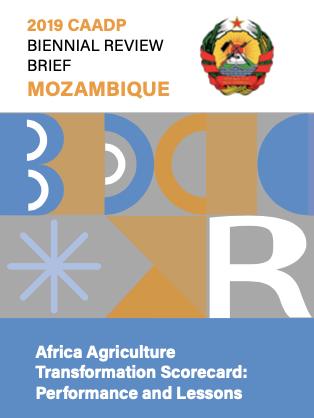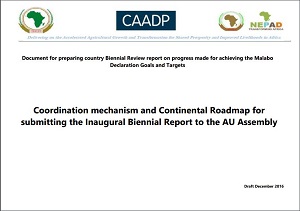With the 2014 Malabo Declaration on Accelerated Agricultural Growth and Transformation for Shared Prosperity and Improved Livelihoods, African leaders recommitted their countries to the pursuit of agriculture-led growth and other principles and values of CAADP, including evidence-based planning, dialogue, and review.
The CAADP Results Framework 2015-2025 was developed as a key tool for translating Africa's agricultural development vision and goals into tangible outcomes and for tracking, monitoring and reporting on progress as well as for facilitating mutual learning and accountability. A key challenge for operationalizing the Results Framework is ensuring adequate data is accessed and used, and credible analysis is undertaken, not only in monitoring progress but also in helping to inform future planning and programming. It is of critical importance to ensure that existing National Agricultural Investment Plans (NAIPs) can be effectively appraised and, where new ones are being formulated, designed in ways that are sufficiently rigorous and consistent with the CAADP goals and commitments in the Malabo Declaration.
Many of the first-generation NAIPs established under the CAADP framework ended in 2015, and several countries have begun to design second-generation NAIPs. In order to ensure that NAIPs include the programmatic elements and investments necessary to achieve the Malabo commitments, technical analysis is required to evaluate countries’ status in the Malabo thematic areas after the first NAIP and to develop country-specific goals, targets and milestones to guide the development of the next NAIP.
The International Food Policy Research Institute (IFPRI) and the Regional Strategic Analysis and Knowledge Support System (ReSAKSS) previously worked with local experts to provide analytical support to close to 30 African countries in designing CAADP compacts and first-generation NAIPs. In 2017 and 2018, IFPRI is leading the provision of technical support to countries for second-generation NAIPs at the request of the African Union Commission (AUC) and NEPAD Planning and Coordinating Agency (NPCA). AUC and NPCA identified an initial group of 14 African countries, to be supported in developing second-generation NAIPs in 2017 and 2018
ReSAKSS has mobilized an Experts Group of African researchers to provide analysis for the countries, with members drawn largely from leading African research networks including the African Growth and Development Policy (AGRODEP) Modeling Consortium and the African Economic Research Consortium (AERC). The experts group is divided into seven sub-groups corresponding to the Malabo thematic areas of
i) overarching public agricultural expenditure and growth, and poverty reduction goals,
ii) regional trade, iii) inclusive growth and value chain development,
iv) food security and nutrition,
v) climate smart agriculture,
vi) gender, and vii) mutual accountability and institutional architecture.
The experts group is supported by a NAIP Task Force of international experts from IFPRI, Africa Lead, FAO, the University of Pretoria, and CORAF. The Task Force has developed a Toolkit document presenting methodologies for NAIP analysis and has provided a series of technical clinics for the Experts Group.
In 2017, the Experts Group and Task Force provided support to advance NAIP development for the 15 ECOWAS countries, including the organization of a capacity strengthening clinic for ECOWAS member states in October, during which the results of analysis were presented and discussed with countries. ReSAKSS will continue to facilitate support for ECOWAS countries in 2018 as well as for non-ECOWAS countries beginning the NAIP development process. ReSAKSS has also assisted in updating guidelines for the NAIP independent technical review, and has participated in technical reviews for next-generations NAIPs in Malawi and Rwanda.

